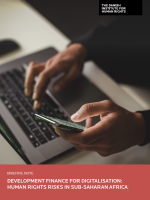
Development finance for digitalisation: Human rights risks in Sub-Saharan Africa
This briefing note aims to support development finance institutions (DFIs) in integrating human rights into their decision-making and stewardship efforts related to digital investments in Sub-Saharan Africa.
The note provides an overview of challenges and opportunities related to the digital transition in Sub-Saharan Africa, as well as perspectives and ways forward for DFIs informed by human rights frameworks applicable to financial actors.
The note gives concrete examples of human rights challenges associated with the digital transition in Sub-Saharan Africa, looking specifically at Digital ID and e-health systems in countries that have revealed shortcomings when it comes to human rights protection in the implementation of these technologies. It also provides perspectives and way forward for DFIs in addressing such challenges.
Background
As the digital for development agenda grows, so do investments into digitalisation projects in the region. However, human rights experts call for heightened attention into potential adverse impacts on human rights associated with digitalisation, especially as it is a fast-growing sector evolving in an under-regulated and under-protected space.
In 2021, the OECD published its report titled ‘Shaping a Just Digital Transformation’, highlighting the importance of upholding human rights and democratic values and calling for development actors to address negative outcomes through institutional strategies, safeguards and risk assessments. Similarly, in February 2023, the OHCHR put out a benchmarking study on DFIs’ Safeguarding Policies, underlining the scattered approach taken by development finance institutions (DFIs) to address different human rights dimensions of digitalisation.
While private finance is deemed a crucial component of the development finance mix contemplated for digitalisation efforts, DFIs should especially be attentive to the role they can play in either furthering gaps or leveraging knowledge of these concrete issues to avoid violations of human rights.
On the one hand, such investments hold the potential of redressing a multi-dimensional digital divide that impairs people’s access to information and essential services such as education and healthcare.
On the other hand, such projects can also enable mass surveillance of populations, interferences in the right to privacy and discriminatory public policies that reinforce rather than address drivers of inequality.
We strive to make the pdf versions of our publications etc. accessible for screen readers. If you experience any problems, please contact Digital Editor Stine Juhl Nielsen on stni@humanrights.dk
